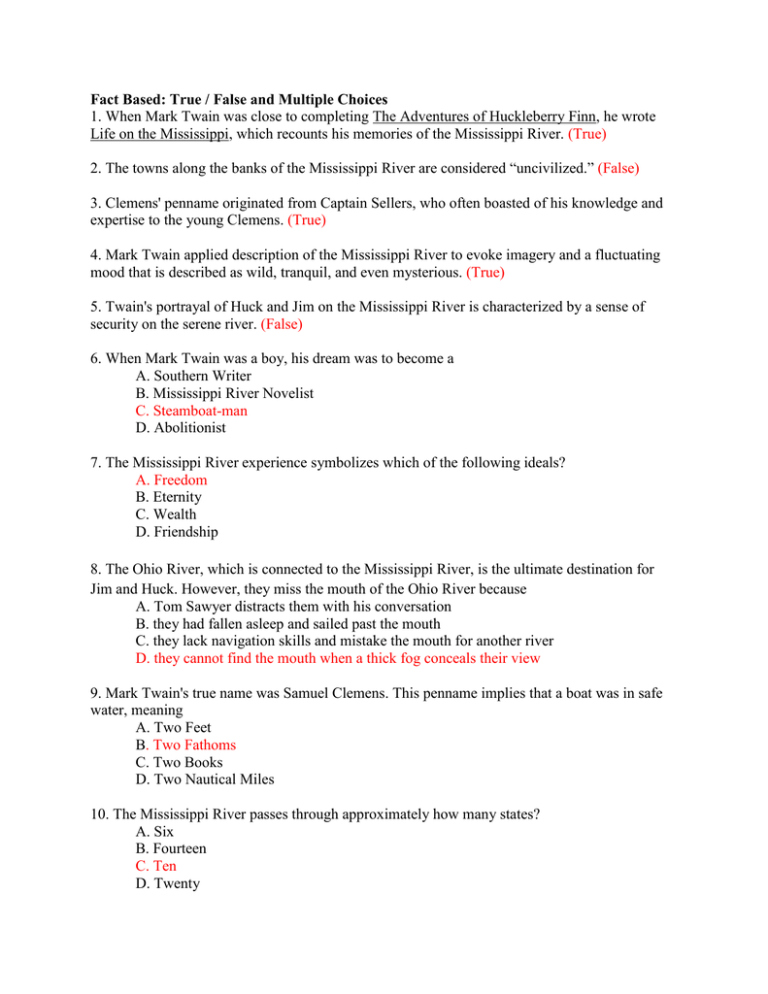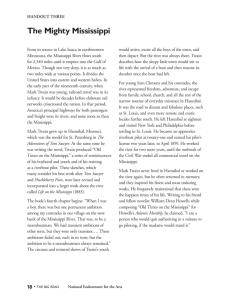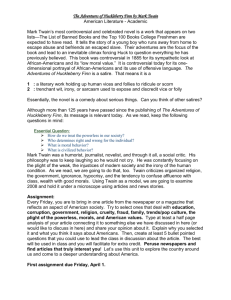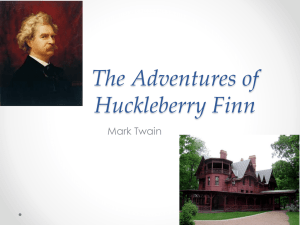HF Project Studyguide Answers BLEE
advertisement

Fact Based: True / False and Multiple Choices 1. When Mark Twain was close to completing The Adventures of Huckleberry Finn, he wrote Life on the Mississippi, which recounts his memories of the Mississippi River. (True) 2. The towns along the banks of the Mississippi River are considered “uncivilized.” (False) 3. Clemens' penname originated from Captain Sellers, who often boasted of his knowledge and expertise to the young Clemens. (True) 4. Mark Twain applied description of the Mississippi River to evoke imagery and a fluctuating mood that is described as wild, tranquil, and even mysterious. (True) 5. Twain's portrayal of Huck and Jim on the Mississippi River is characterized by a sense of security on the serene river. (False) 6. When Mark Twain was a boy, his dream was to become a A. Southern Writer B. Mississippi River Novelist C. Steamboat-man D. Abolitionist 7. The Mississippi River experience symbolizes which of the following ideals? A. Freedom B. Eternity C. Wealth D. Friendship 8. The Ohio River, which is connected to the Mississippi River, is the ultimate destination for Jim and Huck. However, they miss the mouth of the Ohio River because A. Tom Sawyer distracts them with his conversation B. they had fallen asleep and sailed past the mouth C. they lack navigation skills and mistake the mouth for another river D. they cannot find the mouth when a thick fog conceals their view 9. Mark Twain's true name was Samuel Clemens. This penname implies that a boat was in safe water, meaning A. Two Feet B. Two Fathoms C. Two Books D. Two Nautical Miles 10. The Mississippi River passes through approximately how many states? A. Six B. Fourteen C. Ten D. Twenty Short Answers (My Opinion) 1. The distinctive aspect of The Adventures of Huckleberry Finn is its flowing setting. It attracts the reader's attention not only through the topic of slavery, which was at its peak, but also through the physical setting, which ranges from Missouri to Ohio. Through the viewpoints of a young boy and an immature slave, the Mississippi River is described from an outsider perspective of society. How do you think the novel would have been different if a land route, instead of a water route, was utilized throughout the plot? How does the Mississippi River symbolize freedom effectively? I think the novel would have been different if a land route, instead of a water route, was utilized throughout the plot because the Mississippi River provides many places and situations to prevent Jim and Huck from the danger. However, if they used a land route, it would be hard to hide and run away because on the land, their appearances can reveal easily. They can hide in the water and boat, so that people cannot see Jim from outside of the boat. Because Huckleberry and Jim can use the Mississippi River as their route to freedom, Mark Twain uses the Mississippi River to symbol freedom effectively. Along the river, they become free. 2. Mark Twain spent his younger years near the Mississippi River and worked for a steamboat company. His life as a pilot inspired him to write about the river throughout his literary works. Do you have an inspirational place like the Mississippi River? What about this place evokes inspiration? Compare and contrast your inspirational location with Twain's portrayal of the Mississippi River. In front of my home, there is a river called “Han River” that flows through Seoul. Most of the night, I walked along the river and think about my day and future. I walked with my parents, friends, or sometimes, by myself. Because I walked and sometimes run a lot, I feel very warm when I go there. I think these feelings are what Mark Twain’s had for the Mississippi River, where he spent his boyhood. The feelings and events that he experienced at the Mississippi River still stayed in his mind and that would inspire him. 3.No other literary figure has been as closely tied to the Mississippi as Mark Twain. After the Civil War halted his career as a steamboat pilot, Twain turned to journalism and literature. He chose the pen name, "Mark Twain.” What is so significant about this? Why do you think he chose to use this name? The name of “Mark Twain” originally came from Captain Sellers who was Twain’s captain and used to sign with the name of Mark Twain. Mark Twain means “two fathoms” which means the safe water level to sail the steamboat. This again shows the relationship between Mark Twain and the Mississippi River. I think Mark Twain chose this name because he wants to keep the feelings of the Mississippi River that he experienced in his young life. He wants people to sail safely and feels the freedom of the Mississippi River. 4. In The Adventures of Huckleberry Finn, Twain satirized the dark side of human nature greed, corruption, alcoholism, and especially racism - by using a fourteen-year-old boy as the narrator. Twain's novel is a raw yet bittersweet story of Huck's development through lessons taught by Jim, a runaway slave. How does Twain utilize the Mississippi River to draw out such lessons? What characteristics of the river symbolize Huck's growth and maturity? Mark Twain utilized the Mississippi River to draw out to symbolize the freedom and he successfully depicted. With the water’s flowing, Huck and Jim pass and experience the people and life; they can escape from people. They get matured and realize the society as water flows. 5. Mark Twain is often labeled a realist in his portrayal of life on the Mississippi River. What aspects of The Adventures of Huckleberry Finn create a true-to-life image of life back then? Are there any portions of Huck's journey along the river that seem to depart from realism? I think The Adventures of Huckleberry Finn creates more romanticism rather than realism because it is hard to image teenager boy journeys with runaway slave along the Mississippi River, which is peaceful but dangerous, wild, and grand. Quote Analysis: Analysis the following Quotes 1. “It was kind of solemn, drifting down the big still river, laying on our backs looking up at the stars, and we didn’t ever feel like talking loud, and it warn’t often that we laughed, only a little kind of a low chuckle” (119). This quote symbolizes serenity and the placid characteristic of river. Also, readers can see the affection toward the river. 2. “The fifth night we passed St. Louis, and it was like the whole world lit up. In St. Petersburg they used to say there was twenty or thirty thousand people in St. Louis, but I never believed it till I see that wonderful spread of lights at two o'clock that still night” (120). This shows the more exciting aspect of traveling up the river. Yet, the Mississippi River is adventurous and wild. 3. “Well, it being away in the night, and stormy, and all so mysterious-life, I felt just the way any other boy would a felt when I see that wreck laying there so mournful and lonesome in the middle of the river” (121). This shows many characteristics of the river such as mysterious and uncivilized. It depicts the stormy weather of the river. The river has no security, isolated, and grand. 4. "We said there warn't no home like a raft, after all. Other places do seem so cramped up and smothery, but a raft don't. You feel mighty free and easy and comfortable on a raft" (176). The quote reveals the freedom of the Mississippi River. Again, it shows the affection toward the river and how Mark Twain and Huckleberry Finn feels comfortable at the Mississippi River. 5. "It's lovely to live on a raft. We had the sky up there, all speckled with stars, and we used to lay on our backs and look up at them, and discuss about whether they was made or only just happened” (179). It depicts the joyful life of river. Once more, audiences can realize the importance of the Mississippi River and the symbol of the river: freedom.




